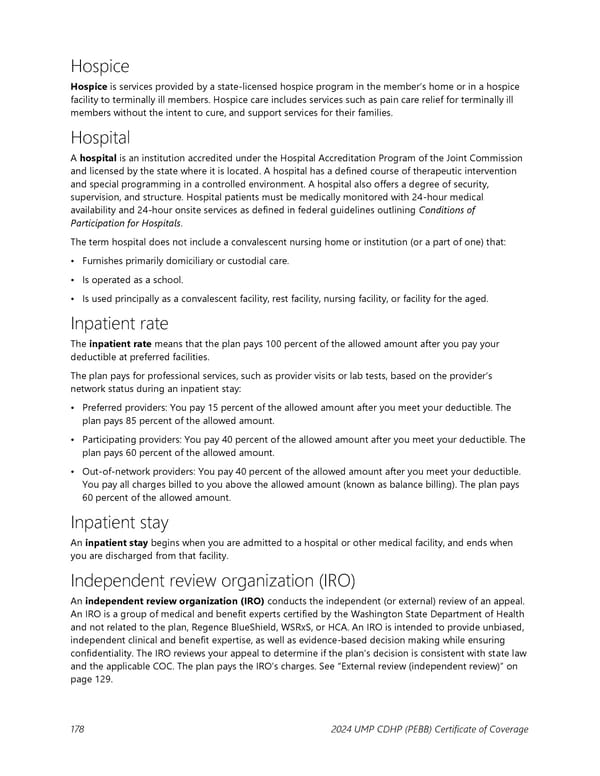Hospice Hospice is services provided by a state-licensed hospice program in the member’s home or in a hospice facility to terminally ill members. Hospice care includes services such as pain care relief for terminally ill members without the intent to cure, and support services for their families. Hospital A hospital is an institution accredited under the Hospital Accreditation Program of the Joint Commission and licensed by the state where it is located. A hospital has a defined course of therapeutic intervention and special programming in a controlled environment. A hospital also offers a degree of security, supervision, and structure. Hospital patients must be medically monitored with 24-hour medical availability and 24-hour onsite services as defined in federal guidelines outlining Conditions of Participation for Hospitals. The term hospital does not include a convalescent nursing home or institution (or a part of one) that: • Furnishes primarily domiciliary or custodial care. • Is operated as a school. • Is used principally as a convalescent facility, rest facility, nursing facility, or facility for the aged. Inpatient rate The inpatient rate means that the plan pays 100 percent of the allowed amount after you pay your deductible at preferred facilities. The plan pays for professional services, such as provider visits or lab tests, based on the provider’s network status during an inpatient stay: • Preferred providers: You pay 15 percent of the allowed amount after you meet your deductible. The plan pays 85 percent of the allowed amount. • Participating providers: You pay 40 percent of the allowed amount after you meet your deductible. The plan pays 60 percent of the allowed amount. • Out-of-network providers: You pay 40 percent of the allowed amount after you meet your deductible. You pay all charges billed to you above the allowed amount (known as balance billing). The plan pays 60 percent of the allowed amount. Inpatient stay An inpatient stay begins when you are admitted to a hospital or other medical facility, and ends when you are discharged from that facility. Independent review organization (IRO) An independent review organization (IRO) conducts the independent (or external) review of an appeal. An IRO is a group of medical and benefit experts certified by the Washington State Department of Health and not related to the plan, Regence BlueShield, WSRxS, or HCA. An IRO is intended to provide unbiased, independent clinical and benefit expertise, as well as evidence-based decision making while ensuring confidentiality. The IRO reviews your appeal to determine if the plan’s decision is consistent with state law and the applicable COC. The plan pays the IRO’s charges. See “External review (independent review)” on page 129. 178 2024 UMP CDHP (PEBB) Certificate of Coverage
 UMP Consumer-Directed Health Plan (CDHP) COC (2024) Page 178 Page 180
UMP Consumer-Directed Health Plan (CDHP) COC (2024) Page 178 Page 180